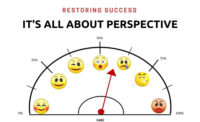Restoring Success: It's All in the Details

The cliché, "it's all in the details," could not be more relevant as it applies to the restoration and cleaning Industries. From estimate writing, to restoration and repairs, to our presentation, the details can make or break you. Consider an estimate submitted with a misspelled word in the summary and/or a mis-measured room. Consider a perfectly executed job with an empty sports drink bottle left on the window sill, or a repair that had wire snippets left on the floor. It would not be hard to convince any professional restorer or cleaner that the details matter. A missed detail or error can take a job from great to just ok or worse yet, poor.
Training, standard operating procedures, accountability, and layers of management are all key ingredients; however, I encourage you to consider adopting a "Detail Oriented Culture." When it comes to details in our field, you can’t think through and document every single one of them. Even if you could, they would not be followed without being part of your culture. Customers are dissatisfied and you will be frustrated by a missed detail.
A few examples to get you thinking about your details and culture:
1. Restored Contents: The item was beautifully and meticulously restored to better than pre-loss condition. The owner opens the box to an item that looks like it was swallowed by a bubble wrap monster with globs of tape that look like they were chewed rather than cut straight with scissors or a twisted string of shrink wrap that looks carelessly tangled around this precious treasure. Functionally, the item was processed and restored properly, it was wrapped in a way that protected the item during storage and delivery, and yet something is wrong. The detail of the tape? Beyond the procedure, it should look like it was wrapped “with love.” (This phrase is not for everyone; you can find the right term for you and your company.) “Wrapped with Love” means details and care, tape cut straight.
2. Water Loss: You save a hardwood floor, you dried it in three days, there is minimal repair work. There is an empty soda can in the bushes, the back door was left unlocked and someone forgot to flush the toilet. These details may not have found their way into your standard operating procedure but they are critically important details.
3. Containment: A perfectly functioning containment system -- on display for days. The tape was applied without care and looks like a mouse chewed on each edge; left on the floor is a piece of poly and a couple balls of discarded tape. A couple minutes of care in the details would make the difference from the job being extraordinary to just acceptable.
4. Communication: An accurate and thorough estimate that was submitted to an adjuster or customer with an email note, “i have attached the estimate. Call my with any questions.” Only two letters, details that make a difference in the impression left.
These examples are not all inclusive. It could be easy to be overwhelmed by the amount of details that must be managed and considered in the world of Restoration. Not only do the details make a difference in the overall quality of your work, but it will also lead to increased skepticism and criticism in the receipt of your services. If you open a content that is wrapped in a haphazard manner you are opening it with the mindset that it is not properly restored. If you receive an estimate with a poorly written email, you open it assuming that there are errors in the estimate.
A Detail Oriented Culture can help you get everyone in your company paying attention to the details. Not to be confused with micro-managing; keep the importance of details top of mind.
1. Get commitment from leadership to reward attention to detail.
2. Be proactive, not reactive. Be conceptual and also specific. Consider maintaining a list of details and pick a couple to review at every meeting. Don’t wait until you get a phone call from a disappointed customer.
3. Inspect what you expect. An old management adage that will help you make details a part of your culture. Random inspections with a report will allow for rewarding good attention to details and address any lack of attention.
4. Do not assume that general terms like detail oriented, or clean job site means the same to everyone. It must be defined and your company has to establish the standards of what a “clean job site” or “details” is acceptable. I do not like the phrase, “________it like it was yours.” An individual’s standard of ___________ may not be up to par with that of your company’s.
5. Let people make fun of you. Someone once said, “Unless your team is making fun of you, you have not said it enough.” I love when the team makes fun of me for talking about, “snippets” or “wrap with love.” (Snippets is the term I use to describe the little scraps of wires that electricians can leave spewed about a job site.)
Don’t be overwhelmed by the amount of details that must be managed. Create a Detail Oriented Culture and let your team proudly pay attention to details.
Looking for a reprint of this article?
From high-res PDFs to custom plaques, order your copy today!








